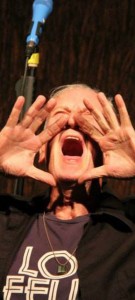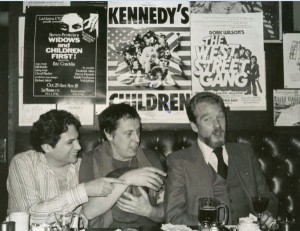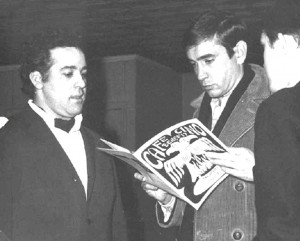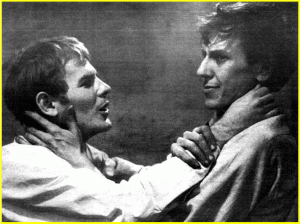
Robert Patrick, born into a migrant worker’s family in 1937, wrote many plays, songs, poems and stories. According to the Samuel French script company, he was the most produced playwright in New York City in the 1970s. His two most famous plays are The Haunted Host (featured in this year’s GayFest! and opening August 8th) and Kennedy’s Children. He currently lives in L.A. and earns a living writing porn reviews.
Henrik Eger: Your parents, migrant workers in Texas, moved around constantly. You never completed a year of school until your high school senior year.
Robert Patrick: The only constant thread in my childhood was the movies, magazines, records, and radio shows, which were the same wherever we moved. When we hit towns that had libraries, I discovered books as well.
HE: Did any people with fundamentalist religious beliefs ever attack you for your atheism?
RP: The only religious attack I can recall was when my stepfather, for what he called “blasphemy,” broke my nose with a cast-iron crucifix. I was in my early twenties. I fled but had nowhere to go, so I secretly sneaked back in and slept in my closet for a few days.
HE: Eventually, you found your way to the Caffe Cino, the birthing place of Off-Off-Broadway, gay and fringe theater—a cultural community in New York’s Greenwich Village during the 1960s. It attracted visitors from all over the world and spawned similar incarnations in other countries. How did that period impact everyone’s emerging creative life at the Cino?
RP: Joe [Cino] was as swept up in the fantastic currents of creation as we all were, as our audiences were, too. All of us, at the start even Joe, were working day jobs in offices and then coming down to Cornelia Street where we were stars, artists, bohemians, conspirators, companions, astonishing ourselves with our invention and our epic exertions.

All of us always had a show in the works, sometimes two shows, three, five, as more and more places opened. Joe called us his “Rockettes.”
HE: At that time, did you ever think that you would become a playwright?
RP: I had no idea that I was going to write more plays, or I would have chosen a more resounding pen-name, like Dominic Tamerlane.
HE: In 1964, you wrote Haunted Host, one of America’s oldest gay plays. Is it still relevant today?
RP: I recently saw an excellent 50th anniversary production of the play in the Desert Rose Playhouse in Palm Springs. To my delight, it works as well as ever. Many in the audience remarked on how un-dated it is.
HE: Two years after Haunted Host, you wrote the first known nude play, Camera Obscura.
RP: I was doing a play across town and didn’t see the first nude weekend of Camera Obscura, and alas, there are no photos. A nude Canadian production was closed, inspiring a newspaper cartoon of the cast being thrown out of the theatrical Garden of Eden by a judge with a flaming sword.
HE: As a member of the Caffe Cino, what was your vision for the future of theater?

RP: I wanted it to stay as it was then forever. I had found my heart’s home. I worked days and lived nights. Success, drugs, and money came and took it all away.
HE: A number of years after the Kennedy assassination you went to Phebe’s Bar in the Village and saw friends of yours sitting in dark booths, gloomy and morose. You saw the bartender click through the T.V. channels. That became the inspiration for your play, Kennedy’s Children, which was to become famous. How did you go about writing it?
RP: Kennedy’s Children was the only play I ever labored over. Usually, I get an idea, write it, and look for a theater. I actually wrote the five characters’ speeches separately and then arranged them and revised them for resonance and empathy. I also wrote my best play, Judas, the same week.
HE: In spite of your success with Kennedy’s Children, produced on Broadway, you did not relate to the mainstream theater.
RP: All the successful people I met were obsessed with themselves and their careers and seemed startlingly insecure. It was not an exciting crowd, compared to the marvelous, dedicated people at the Cino.
HE: Apparently you’ve stopped writing plays since 1990. Was this a dark time in your life, or had your focus shifted?
RP: My wells of creativity have been doing just fine all along, thank you. I did two years of ghosting for young TV writers. I have a number of unproduced plays, three screenplays, literally hundreds of pornographic poems, many, many songs, and an enormous autobiography.
HE: Your life would make a great movie. You also are the keeper of the Caffe Cino flame and the liberation it brought to theater.
RP: Yes, I have sparked a revival of interest and respect for the Caffe Cino’s role in world theater history with my online Caffe Cino pages. And I am occasionally allowed to give my illustrated lecture on “Caffe Cino: Birthplace of Gay Theatre.”
HE: Your plays blend the comic and satirical with the serious and tragic.

RP: To me there is no profound distinction between comedy and tragedy.
HE: What do you think your life would have been like without Caffe Cino?
RP: I would have returned to Santa Fe or Roswell and might have wound up a suicide, or I might have started a little theater. Either would have been equally likely.
HE: What does your life actually look like these days?
RP: I [walk] 60 blocks a day. It’s easy—I just have elaborate sexual fantasies all the way. Aside from endless nerve-frazzling worry about the rent—every five minutes I shudder at the thought of living on the streets—I’m a happy man.
HE: Robert Patrick, is there anything else you would like the world to know?
RP: Someday we will all be dead and these buildings dust, and in their ruins mutated omnivores will grub for sustenance among the orchids growing on our graves, so let us not make so much fuss about our petty differences. Just quit having babies and let us all enjoy the multitude of blessings this world could offer us as we slowly become extinct.
HE: Bob, you’re still alive and kicking!
RP: My motto has always been, “What doesn’t kill me makes a great story later.”
Robert Patrick’s Haunted Host will be performed as part of the Quince Production’s 4th annual GayFest! [Plays & Players (Skinner Studio), 1714 Delancey Place] August 8-22, 2014. quinceproductions.com.

80 pages of pictures and some short plays from the Caffe Cino: http://caffecino.wordpress.com/
Photo of Joe Cino and Edward Albee by Jim Gossage.